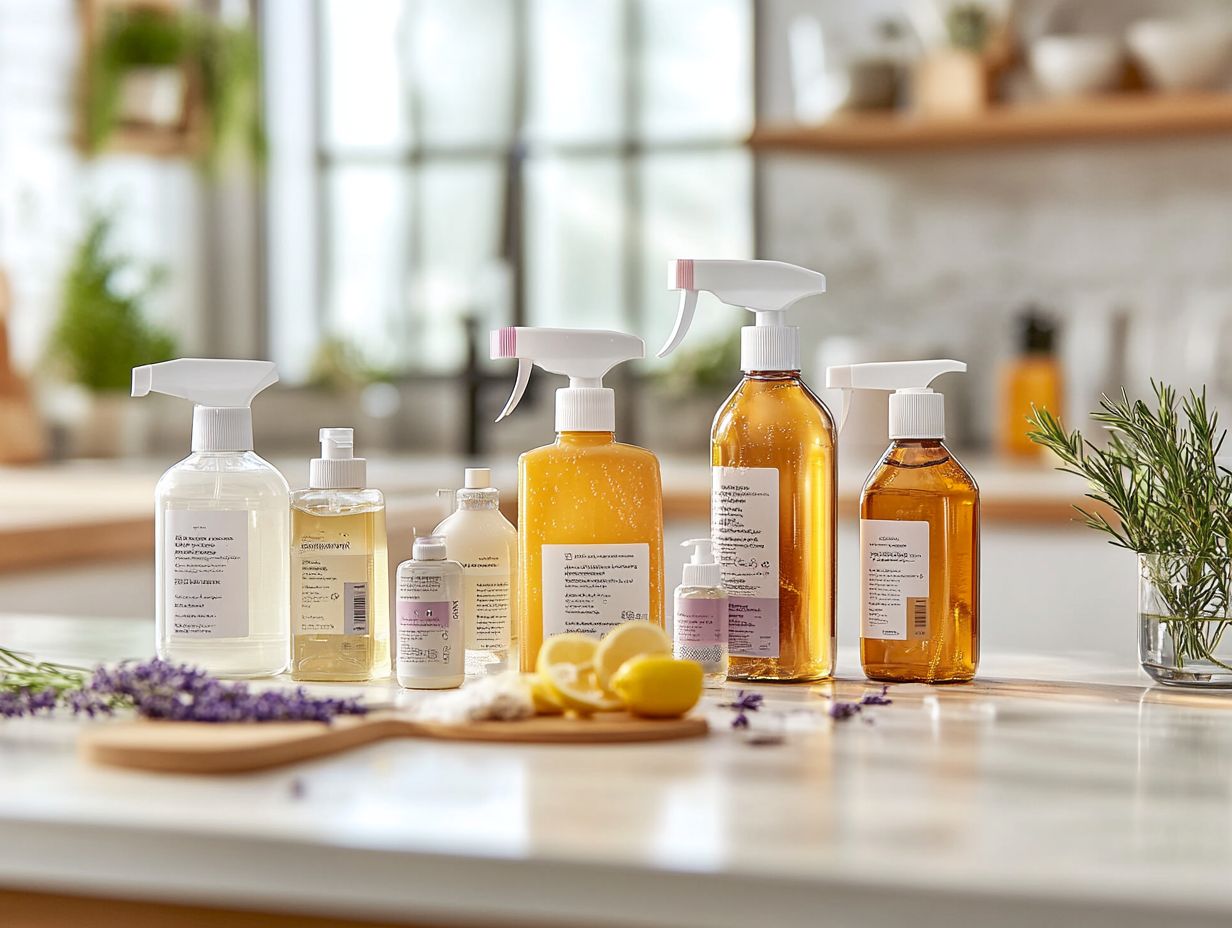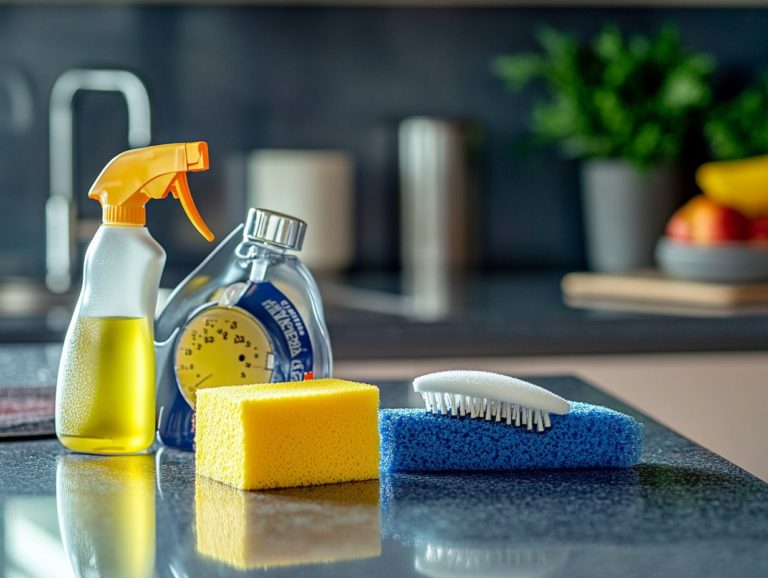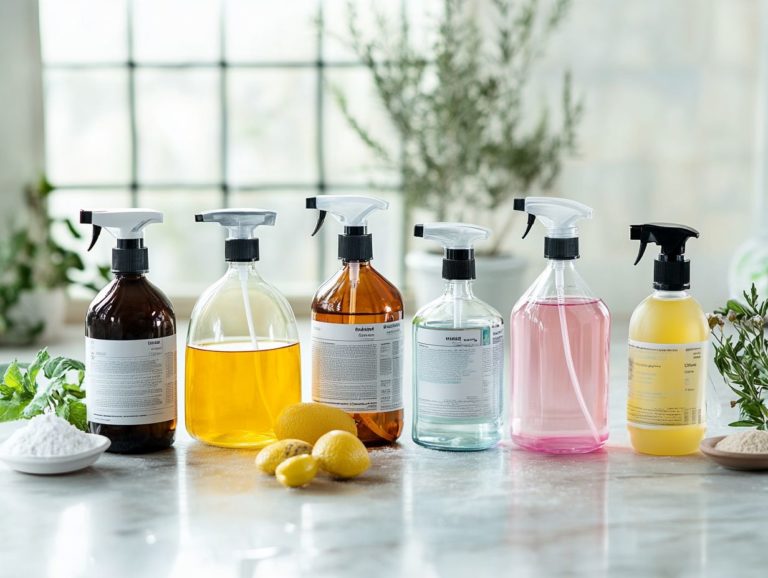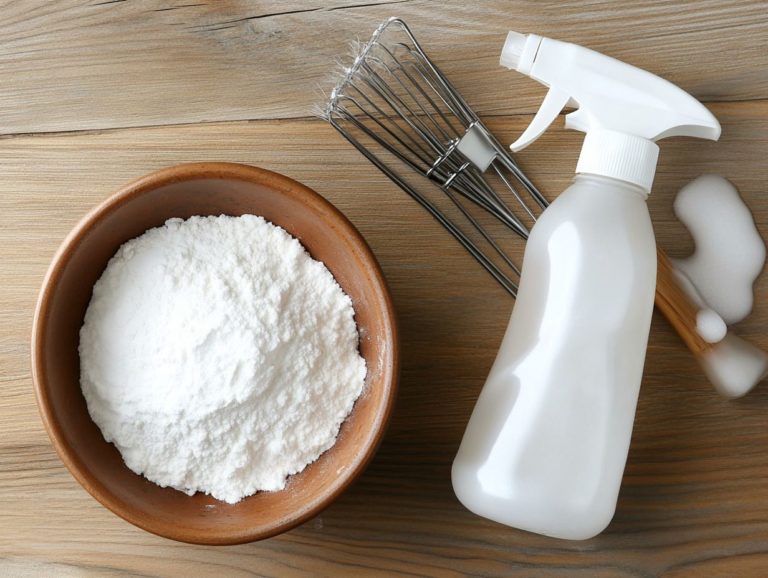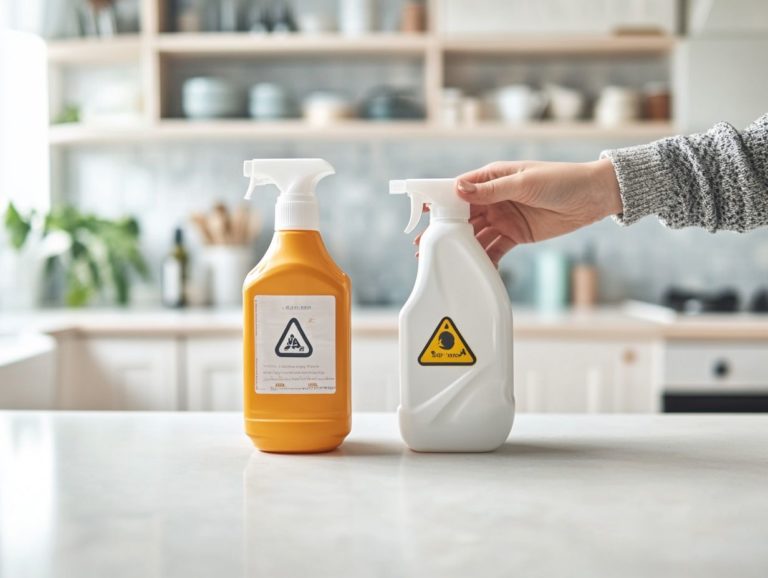What Should I Know About Scented Cleaners?
Scented cleaners have emerged as a favored option for households. They provide effective cleaning power alongside captivating fragrances, transforming the ambiance of your space. Whether you’re using essential oils or synthetic fragrances, these products have revolutionized household cleaning.
While fragrant products can brighten your home and uplift your spirits, it s crucial to understand their benefits and potential risks, including health impacts and environmental considerations.
This guide will equip you with everything you need to know about scented cleaners. It covers their ingredients, essential safety tips, and ways to make informed choices for a cleaner, fresher environment. By understanding these elements, you can balance cleaning effectiveness with health impacts.
Contents
Key Takeaways:
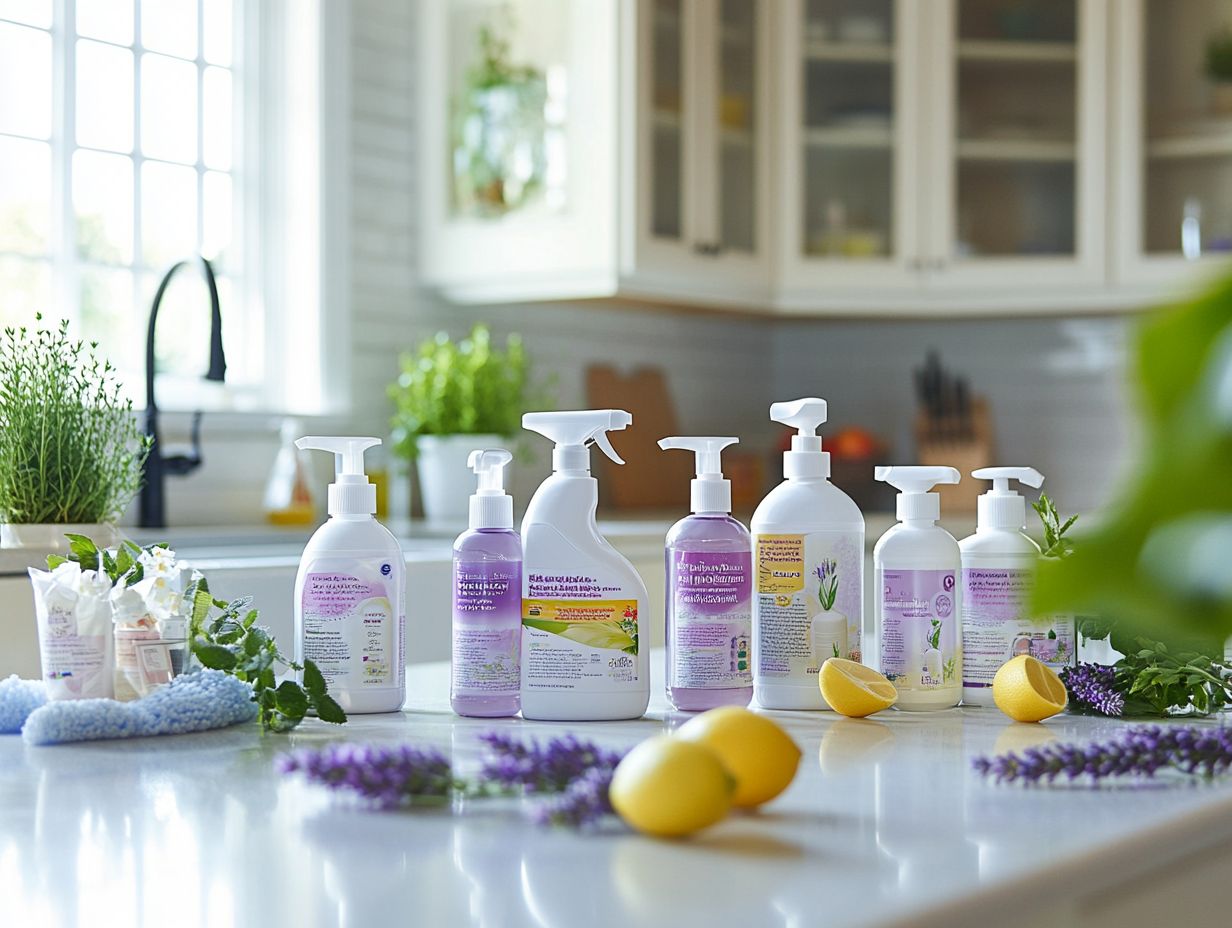
- Scented cleaners provide a pleasant fragrance and can mask unpleasant odors, but they may also have psychological benefits.
- Health considerations are crucial, as these products may contain toxic chemicals that could affect indoor air quality.
- Using scented cleaners can expose you to harmful chemicals and may cause allergic reactions. Consider the potential environmental impact as well as safety standards.
- Common ingredients in scented cleaners include fragrances, surfactants (substances that help remove dirt and grease), and preservatives like Butylphenyl Methylpropional and Hydroxyisohexyl 3-cyclohexene carboxaldehyde. To use them safely, read the label and use them in well-ventilated areas, or consider alternative options such as green cleaning.
What Are Scented Cleaners?
Scented cleaners are household products designed to make cleaning more enjoyable by adding pleasant aromas to the process. They elevate your cleaning routine by combining effective cleaning power with delightful aromas, turning mundane tasks into enjoyable experiences.
These cleaning solutions utilize essential oils and synthetic fragrances to produce popular scents like lavender fresh, lemon fresh, and potpourri. Brands such as Handy Andy and Mrs. Meyers lead the charge in offering fragrant cleaners, catering to those who value both a pristine environment and a pleasing scent. Additionally, Saint Olio offers aromatic cleaners that blend essential oils for unique scent experiences.
A tool that helps categorize scents, known as the fragrance wheel, classifies these aromas into floral notes, citrus notes, woody notes, oriental notes, and fresh notes. This provides you with a rich array of options to suit your personal preferences.
What Are the Benefits of Using Scented Cleaners?
Using scented cleaners can transform your home into a fragrant paradise! The delightful fragrance envelops your space, whether it s the invigorating aroma of eucalyptus or the soothing essence of lavender.
This aromatic experience not only elevates your indoor air quality but also evokes positive emotions and cherished memories. Scented cleaners effectively mask unpleasant odors, transforming your environment into a more welcoming haven.
By embracing products with enchanting scents, you can elevate your cleaning routine into a truly sensory indulgence. Explore our range of scented cleaners today and discover your favorite scent!
1. Pleasant Fragrance
A delightful fragrance is one of the primary reasons you might choose scented cleaners over traditional products. It effortlessly transforms the often mundane task of cleaning into a refreshing experience. Scents like lavender, lemon, and eucalyptus are gaining traction for their remarkable ability to create a calming atmosphere while enhancing your perception of cleanliness at home.
By choosing cleaners infused with essential oils, you indulge in a pleasing aroma while harnessing the natural cleaning properties these oils bring. You can also enhance DIY cleaning recipes with essential oils for added fragrance and effectiveness.
These fragrances evoke memories or feelings linked to relaxation, productivity, or nostalgia, profoundly influencing how you perceive your living spaces. For example, the crisp scent of lemon sparks alertness and enhances focus, making it an ideal choice for your kitchen. In contrast, the soothing aroma of lavender cultivates a serene ambiance, perfect for unwinding in the bedroom.
How scents are marketed plays a significant role, employing emotional cues and appealing visuals to connect with you, the consumer. The exciting variety of options available increasingly shapes your shopping habits as you seek to blend functionality with sensory pleasure in your cleaning routines. Fragrance cleaning has become a key element in enhancing the user experience.
2. Masking Odors
Scented cleaners are your secret weapon for masking unpleasant odors in any environment. They ensure your space not only looks immaculate but also smells fresh and inviting. These products shine in kitchens and bathrooms, where odors tend to linger from cooking or hygiene activities. Incorporating aromatic cleaners with popular scents can significantly elevate indoor air quality while creating a welcoming ambiance.
The science behind odor masking is fascinating. It involves specific scent ingredients that interact with your nose, effectively overpowering less desirable smells. Take Fabuloso, for example. This beloved household cleaner combines a delightful aroma with powerful cleaning abilities, transforming mundane chores into a sensory delight. Similarly, Method s eco-friendly formulas offer a fragrant solution that not only vanquishes tough odors but also promotes a healthier home environment.
Choose these scented cleaners to enjoy the perks of a consistently fresh atmosphere, elevating your mood and enhancing the overall charm of your living spaces.
3. Psychological Benefits
The psychological benefits of using scented cleaners are remarkable. Engaging your senses through aroma can profoundly influence your mood, stress levels, and overall well-being. Research has shown that certain scents can evoke positive memories and feelings, transforming the act of cleaning from a mundane chore into a delightful, therapeutic experience.
The calming essence of lavender and the zesty scent of citrus can elevate your spirits and alleviate anxiety, encouraging a more positive outlook on household tasks. Familiar fragrances activate brain regions associated with comforting memories, enhancing your emotional health.
While essential oils can be a wonderful addition to your cleaning routine, it’s important to use them in moderation and be mindful of any individual sensitivities. Essential oils’ safety should be a priority. Experts advise consulting with a healthcare provider before introducing new scents into your home to avoid adverse reactions.
Integrating pleasant aromas into your daily routines can elevate your cleaning experience. This contributes not just to a fresher environment but also to an overall enhancement of your mental wellness. This emphasizes the importance of selecting cleaning supplies that offer both aromatherapeutic and cleaning benefits.
What Are the Risks of Using Scented Cleaners?
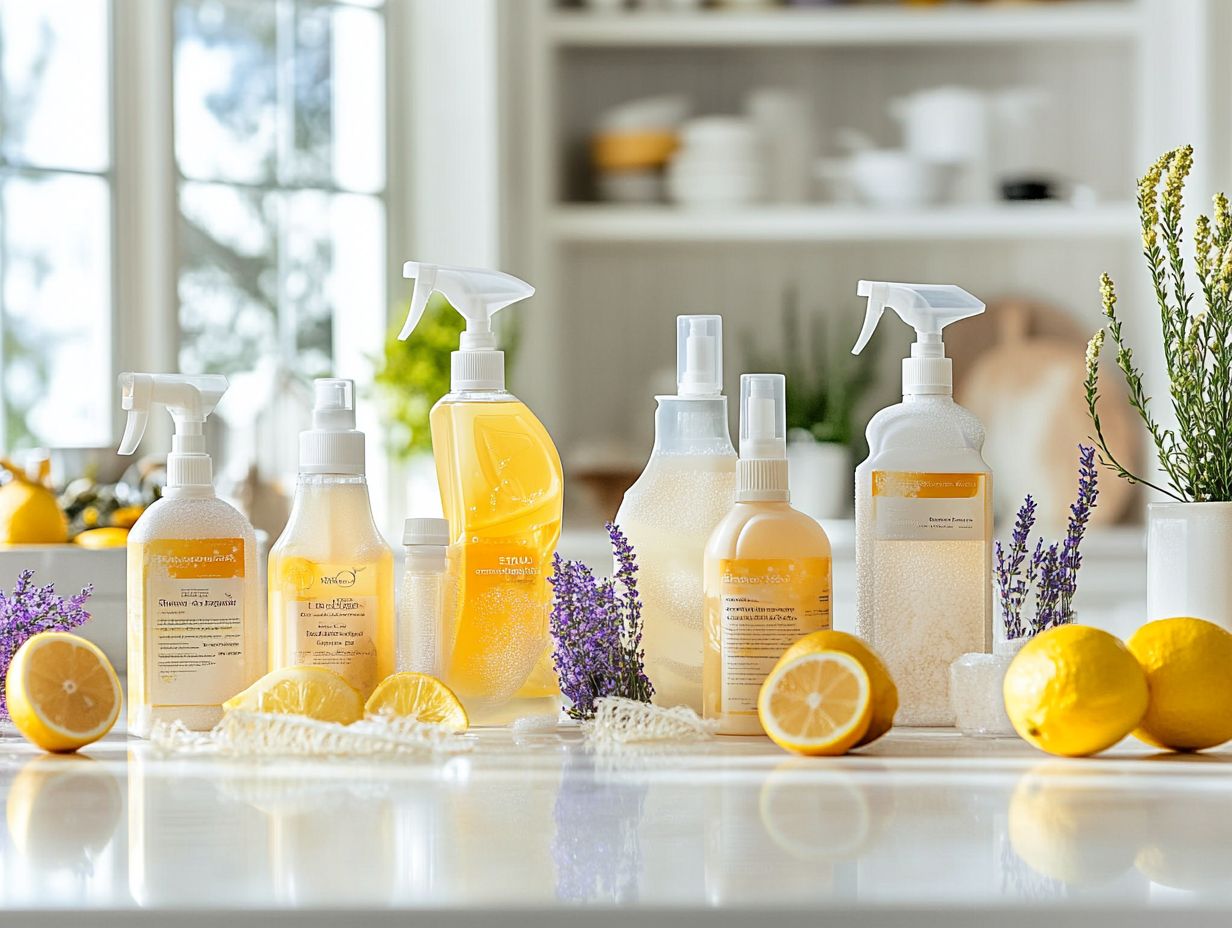
While scented cleaners come with appealing benefits, it’s vital to be aware of the potential risks that accompany their use. Exposure to synthetic fragrances can trigger respiratory issues and allergic reactions, particularly in sensitive individuals.
Consider the environmental implications of certain cleaning products. Some ingredients contribute to indoor air pollution and negatively affect environmental health. Grasping these risks, including the impact of toxic chemicals, is essential for making well-informed choices about the cleaning supplies you bring into your home.
1. Chemical Exposure
Chemical exposure is a serious concern when using scented cleaners, especially those laden with synthetic fragrances. These products can release harmful chemicals that can evaporate into the air into your living space. Prolonged exposure can lead to health issues, from respiratory problems and skin irritation to chronic conditions, particularly in vulnerable household members.
It s essential to understand the ingredients in your cleaning products. Doing so is crucial for maintaining good indoor air quality and safeguarding your family’s health. Opting for eco-friendly products can help reduce chemical exposure.
Many scented cleaners today contain harmful chemicals like phthalates, which enhance fragrances but may disrupt hormonal balance. The Environmental Protection Agency (EPA) emphasizes choosing products with fewer hazardous ingredients to minimize risks associated with indoor air pollution. The National Institute of Environmental Health Sciences advises consumers to be cautious with fragrance ingredients.
By opting for green or eco-friendly alternatives, you prioritize your personal health and contribute to a broader movement to reduce the environmental impact of synthetic chemicals. Brands like Method s eco-friendly formulas, known for their plant-based ingredients, and SC Johnson, which focuses on safer formulations, are making strides in providing sustainable cleaning solutions.
2. Allergic Reactions
Allergic reactions to scented cleaners can present significant challenges for those sensitive to certain fragrance ingredients. These reactions can lead to headaches, skin irritation, and respiratory distress.
Common allergens in many cleaners highlight the pressing need for fragrance disclosure. Compounds like Butylphenyl Methylpropional can trigger reactions. Understanding these potential triggers is essential for safeguarding those with fragrance allergies while ensuring that cleaning protocols remain safe for everyone in the household.
Identifying symptoms is crucial; you may experience a range of reactions, from mild sneezing and itchy eyes to more severe manifestations like asthma attacks or dermatitis. Read labels carefully to protect yourself and your family! Opt for products explicitly indicated as fragrance-free or hypoallergenic, particularly those with clear fragrance disclosure.
The rising demand for fragrance-free alternatives showcases awareness of these concerns, prompting manufacturers to expand their offerings. By choosing these safer options, you minimize exposure to harmful chemicals and contribute to a healthier indoor environment, improving indoor air quality and reducing chemical exposure.
In conclusion, being informed about the risks of scented cleaners is crucial for maintaining a safe home. Prioritizing eco-friendly products not only benefits your health but also supports a cleaner environment. Share this information with friends or family who may benefit from understanding the risks of scented cleaners!
3. Environmental Impact
The environmental impact of scented cleaners is significant. Many contain toxic chemicals that can harm ecosystems and pollute our surroundings.
Choosing green cleaning and eco-friendly products shows a growing awareness of environmental health. By opting for biodegradable options and natural cleaners, you can reduce your impact on the environment while still achieving great cleaning results.
These choices protect air and water quality. They also boost the well-being of families, especially those with sensitivities, allergies, or skin irritation.
Using environmentally-friendly products can drive demand for sustainable manufacturing practices. This encourages companies like SC Johnson and Seventh Generation to innovate and offer safer alternatives.
More people are becoming aware of the health impacts of traditional cleaners. This collective movement towards greener solutions promises a cleaner, healthier planet for future generations.
What Are Some Common Scented Cleaner Ingredients?
Common ingredients in scented cleaners include fragrances, surfactants, and preservatives. Each serves a specific purpose in the cleaning formula.
Fragrances can come from natural sources, like essential oils, or be created synthetically. Both types affect the product’s aroma and safety.
1. Fragrances
Fragrances in scented cleaners may come from essential oils or synthetic compounds. Each has its own safety and effectiveness implications.
Natural essential oils like lavender and eucalyptus are often preferred for their pleasant scents and potential antibacterial properties. In contrast, synthetic fragrances may carry chemical risks and allergic reactions.
When choosing between natural and synthetic fragrances, consider your scent preferences and safety standards. Many consumers prefer products with natural ingredients, viewing them as safer options.
Synthetic fragrances can offer longer-lasting scents and lower costs, appealing to fragrance marketing. However, the lack of transparency around synthetic compositions raises concerns about what you are bringing into your home.
2. Surfactants
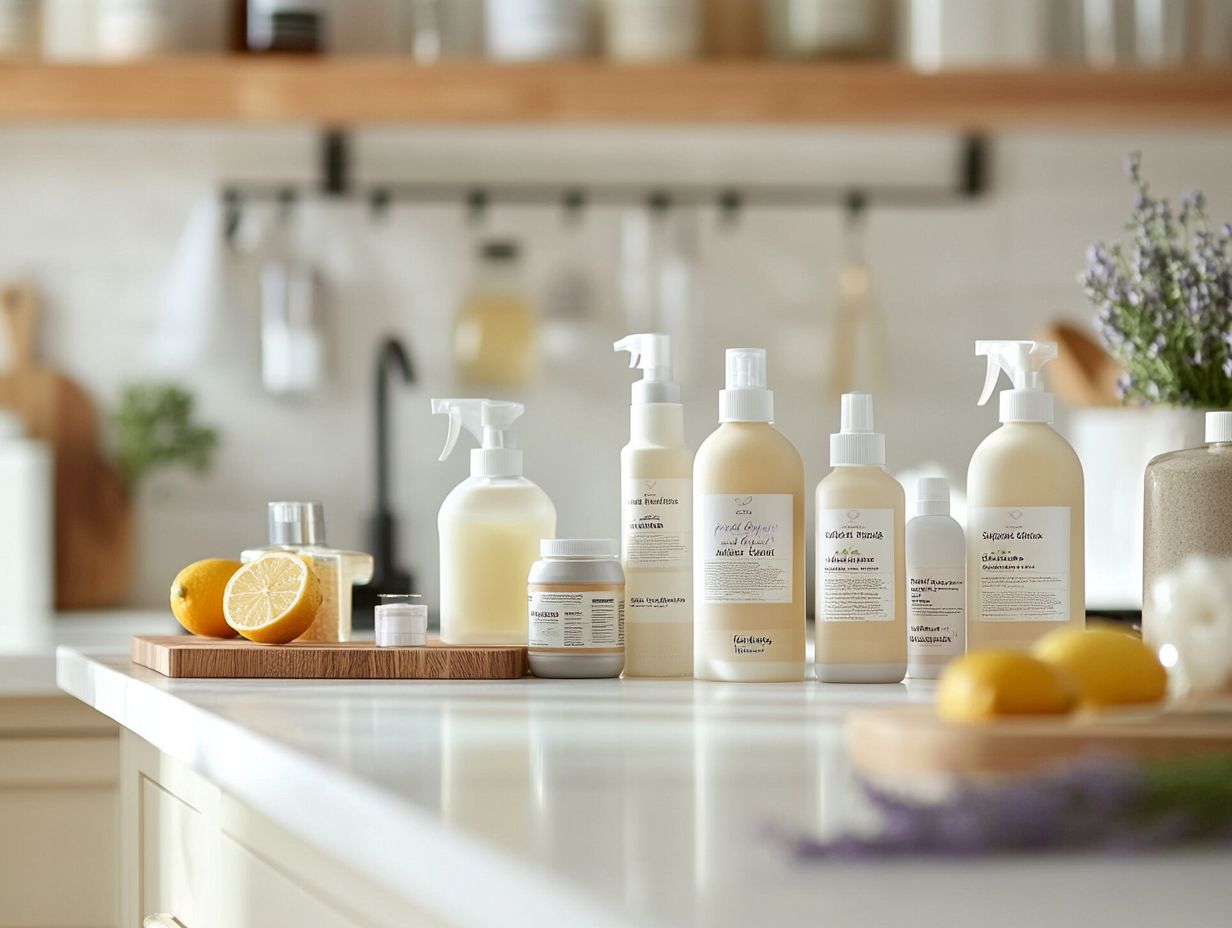
Surfactants play a crucial role in effective cleaning solutions. They expertly break down dirt, grease, and stains to maximize cleaning power. These ingredients work by reducing surface tension, allowing water to spread and penetrate more easily an essential factor for achieving optimal results in all your cleaning endeavors. By understanding the role of surfactants, you can make informed choices when selecting cleaning supplies that truly deliver on their promises of cleanliness and efficacy.
There are various types of surfactants, including anionic, cationic, nonionic, and amphoteric, each serving its distinct purpose. Anionic surfactants are often found in laundry detergents because of their robust cleaning abilities. Nonionic surfactants are celebrated for their gentleness, making them ideal for delicate surfaces and fabrics like those cleaned by Handy Andy. However, some surfactants can raise health concerns, particularly those that may irritate the skin or contribute to environmental pollution.
To mitigate these risks, explore safer, biodegradable alternatives that maintain effective cleaning without compromising your health or the integrity of ecological systems. Choose cleaning supplies wisely; your health and the environment depend on it!
3. Preservatives
Preservatives are essential for extending the shelf life of your cleaning products. They help prevent the growth of bacteria and fungi that could undermine their effectiveness. However, some preservatives have raised health concerns, leading many consumers like you to seek out safer alternatives. By understanding why preservatives are used and the potential risks they may carry, you can make informed choices about the cleaning supplies you invite into your home.
Common preservatives in scented cleaners include parabens, phenoxyethanol, and formaldehyde-releasing agents like Butylphenyl Methylpropional and Hexamethylindanopyran. These are all designed to inhibit microbial growth and maintain product stability. While these substances are effective, they may carry risks such as allergic reactions, skin irritation, and potential endocrine disruption. This makes it crucial for you to be discerning when selecting cleaning products.
Brands like Seventh Generation and Method are being transparent about their formulations. They offer cleaner alternatives that prioritize your safety without compromising on quality. By choosing these products, you can foster a healthier living environment while keeping your household spick and span, adhering to cleaning protocols that prioritize environmental health.
Top Tips for Using Scented Cleaners Safely!
Using scented cleaners safely requires a thoughtful approach to minimize risks while enhancing their benefits. Always use these household products in well-ventilated spaces to ensure proper airflow and lower the concentration of chemicals in the air.
It’s also crucial to adhere to the instructions on the label for effective and safe usage, maintaining safety standards. If you find that you have sensitivity to specific ingredients, don t hesitate to explore alternative options that might be more suitable for your needs.
1. Use in Well-Ventilated Areas
Using scented cleaners in well-ventilated areas is essential for preserving indoor air quality and minimizing your exposure to potentially harmful chemicals. Proper ventilation disperses strong fragrances and reduces the concentration of airborne pollutants, making your cleaning process safer for everyone in the household.
By simply opening windows or utilizing fans, you can significantly enhance air circulation during and after your cleaning routine. This reduces the risk of allergic reactions.
Consider the type of space you re cleaning; kitchens and bathrooms, for example, often demand more robust airflow due to higher humidity levels that can trap odors and toxins, potentially leading to respiratory issues. Employing exhaust fans or strategically placing box fans near windows can effectively help expel unwanted particles, maintaining optimal indoor air quality.
Incorporating natural ventilation through air purifiers equipped with HEPA filters can further elevate your indoor air quality.
By prioritizing airflow while cleaning, you create a more pleasant environment and foster healthier living spaces that are free from excessive chemical exposure.
2. Follow Instructions on Label
Following the instructions on the label is crucial for ensuring both the safety and cleaning effectiveness of scented cleaners. Manufacturers provide specific guidance on how to use their products safely, detailing recommended dilution ratios, application methods, and essential safety precautions. By adhering to these instructions, you not only enhance the performance of the cleaning solution but also protect yourself from unintended exposure to toxic chemicals.
Understanding product labels enables you to make informed choices about the ingredients and potential allergens present in these cleaners, an essential consideration for those with sensitivity, respiratory issues, or concerns about chemical exposure. It’s wise to pay close attention to symbols or terms that indicate compliance with safety standards, as these assure you that the product has undergone rigorous testing for both effectiveness and environmental friendliness, echoing practices endorsed by the Environmental Protection Agency.
By choosing safer products, you are not only prioritizing your personal health but also contributing to broader ecological benefits. These products are less likely to harm aquatic life or contaminate soil when disposed of correctly, aligning your cleaning habits with a more sustainable and responsible approach. Additionally, using eco-friendly products helps to minimize toxic chemicals in your home and the environment.
3. Consider Alternatives
Considering alternatives to traditional scented cleaners can lead you to healthier and more environmentally friendly choices for your cleaning routine. These alternatives can improve your indoor air quality and reduce potential chemical exposure.
By exploring options that rely on simple, natural ingredients, you can discover a wealth of effective cleaning solutions that are both safe and sustainable. For example, vinegar acts as a powerful disinfectant while neutralizing odors, making it a versatile addition to your cleaning arsenal. Baking soda can effortlessly tackle stubborn stains and absorb unwanted moisture, serving as a natural deodorizer. Products like Handy Andy and Fabuloso also offer eco-friendly and effective alternatives.
Essential oils not only provide a delightful fragrance but also boast antibacterial properties, enhancing the effectiveness of your DIY mixtures. For instance, lavender and eucalyptus oils not only smell great but also provide additional cleaning benefits. Embracing these alternatives allows you to create a fresher home environment free from harsh chemicals, yielding benefits for both your personal health and the planet.
Frequently Asked Questions
What Should I Know About Scented Cleaners?
Scented cleaners refer to cleaning products that have been infused with fragrances or scents to provide a pleasant aroma while cleaning. These products, which can include brands like Mrs. Meyers and Method, are commonly used in households and commercial settings for various cleaning purposes. They often come in popular scents like lemon fresh and lavender fresh.
Why Are Scented Cleaners Popular?
Scented cleaners are popular because they provide a refreshing and pleasant smell while cleaning, making the experience more enjoyable. The fragrance also gives a sense of cleanliness and can help mask any unpleasant odors in the space. Some of the popular scents include citrus notes, floral notes, and woody notes.
Are scented cleaners safe to use?
Yes, scented cleaners are generally safe to use. However, it is important to read the label and follow the instructions carefully to ensure safe and effective use. Some individuals may be sensitive to certain scents, leading to fragrance allergies or allergenic reactions, so it is recommended to test a small area first before using the product extensively.
What are the common types of scented cleaners?
There are various types of scented cleaners available. These include all-purpose cleaners, bathroom cleaners, floor cleaners, and laundry detergents.
Each type is formulated for different cleaning purposes. They come in various scents to suit personal preferences. Brands like SC Johnson and Saint Olio offer unique scent ingredients.
Can scented cleaners cause any health concerns?
Some individuals may experience irritation from certain fragrances. This can lead to skin irritation or respiratory issues.
Use these products in a well-ventilated area and avoid prolonged exposure. If you experience any adverse reactions, stop using the product and seek medical attention if necessary.
Are there any eco-friendly options for scented cleaners?
Yes! Eco-friendly scented cleaners are available. These products use natural ingredients and essential oils, which are natural oils extracted from plants.
These cleaners are better for the environment and for individuals with sensitivities to strong scents. Choosing green cleaning practices improves environmental health and reduces health risks from chemical exposure!

